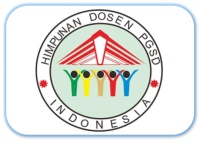PENGARUH PENGGUNAAN MODEL PROBLEM BASED LEARNING TERHADAP HASIL BELAJAR KECEPATAN DAN DEBIT DI KELAS V SDN 09 BELAKANG BALOK KOTA BUKITTINGGI
Abstract
Keywords
References
Arlis, Syamsu. (2013). Penerapan Pendekatan Kontekstual dalam Pembelajaran IPA di Sekolah Dasar. PEDAGOGI | Jurnal Ilmiah Ilmu Pendidikan. Volume XIII No.2, 113-122.
Amir, Z. (2015). Mengungkap Seni Bermatematika dalam Pembelajaran. Suska Journal of Mathematics Education. Vol 1. No.1, 60-76.
Arikunto, Suharsimi. (2007). Manajemen Penelitian. Jakarta : Rineka Cipta.
Ates, O & Eryilmaz, A. (2010). Factors affecting performance of tutors during problem-basedlearning implementations. Procedia Social and Behavioral Sciences 2 , 2325–2329.
Ersoy, E & Başerb, N. (2014) . The effects of problem-based learning method in higher educationon creative thinking. Procedia - Social and Behavioral Sciences 116, 3494 – 3498.
Ditspd. (2018, Oktober). Siswa Sekolah Dasar Kembali Raih Prestasi di Ajang IMSO Tahun 2018. Direktorat Pembinaan Sekolah Dasar. Diperoleh dari http://ditpsd.kemdikbud.go.id/in dex.php/2018/10/05/siswasekolah-dasar-kembali-raihprestasi-di-ajang-imso-tahun2018/
Gewati, mikhael. (2018). Edukasi. Kemampuan Matematika Siswa Indonesia Memprihatinkan, Solusinya?.. Hlm.1-2. (https://edukasi.kompas.com/rea d/2018/03/21/09211381/kemamp uan-matematika-siswaindonesia-memprihatikan
solusinya diakses 07 Februari 2019).
Kenedy, A. K dan Hellsa, Y. (2017). Literasi Matematis dalam Pembelajaran Berbasis Masalah. PROSIDING: Seminar Nasional Pendidikan Guru Sekolah Dasar (Pembelajaran Literasi Lintas Disiplin Ilmu Ke-SD-an). Padang: Jurusan PGSD FIP UNP. 165-174.
Masitoh, Lisda F dan Firtiyani, H. (2018). Improving Students’ Mathematics Self-Efficacy Through Problem Based Learning. Malikussaleh Journal of Mathematics Learning ( MJML). Vol 1. No.1, 26-30.
Nurtanto dkk (2018). Problem-Based Learning Implementation: Improvement In Learning Process And Results In Vocation
Prawira, Purwa Atmaja. (2016). Psikologi Pendidikan dalam Perspektif Baru. Jogjakarta: ArrRuzz Media
Prasetyo, Bambang dan Jannah, Lina M. (2011). Metode Penelitian Kuantitatif. Jakarta: Rajawali Pers.
Rusman. (2012). Model-model Pembelajaran. Jakarta: Rajawali.
Siregar, Syofian. (2011). Statistika Deskriptif untuk Penelitian Dilengkapi Perhitungan Manual dan Aplikasi SPSS Versi
Jakarta: PT RajaGrafindo Persada.
Sukmadinata, Nana Syaodih. (2009). Metode Penelitian Pendidikan. Bandung : PT Remaja Rosdakarya Offset.
Wahyu, K dan Mahdufy, S. (2016). Sejarah Matematika: Alternatif Strategi Pembelajaran Matematika. Jurnal Tadris Matematika. Vol 9. No.1, 89-110
DOI: http://dx.doi.org/10.24036/e-jipsd.v8i1.8062


